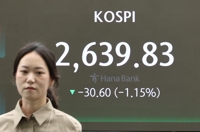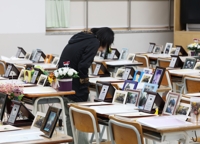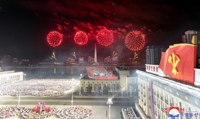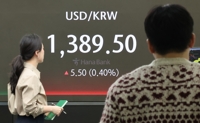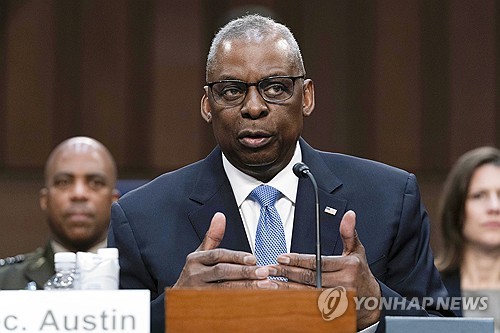(5th LD) N.K. decides to suspend nuclear, missile tests, shut down atomic test site
(ATTN: REWRITES lead; UPDATES with more info throughout)
By Kim Soo-yeon
SEOUL, April 21 (Yonhap) -- North Korea will suspend nuclear and missile tests and shut down its atomic test site, its state media said Saturday, in a surprise announcement that could give momentum to its upcoming summits with South Korea and the United States.
The announcement came amid a diplomatic push to denuclearize North Korea, the main agenda for North Korean leader Kim Jong-un's planned meetings with his counterparts from the South and the U.S.
"We will discontinue nuclear test and inter-continental ballistic rocket test-fire from April 21," the Korean Central News Agency (KCNA) said, citing the outcome of a key meeting of the ruling party held Friday.
"The northern nuclear test ground of the DPRK will be dismantled to transparently guarantee the discontinuance of the nuclear test," it said, referring to the North by its official name, the Democratic People's Republic of Korea.
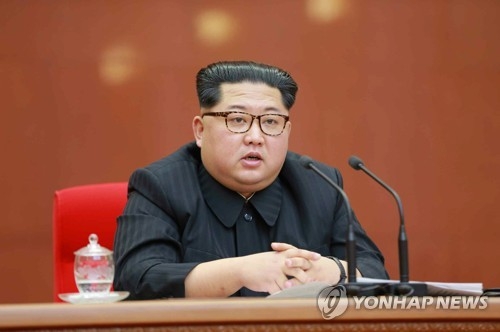
This photo, carried by the Rodong Sinmun, North Korea's official newspaper, on April 21, 2018, shows North Korean leader Kim Jong-un presiding over a plenary meeting of the ruling Workers' Party of Korea's central committee a day earlier. (For Use Only in the Republic of Korea. No Redistribution) (Yonhap)
The report also said that North Korea will neither use nuclear weapons nor transfer nukes or nuclear technology under any circumstances, unless there are nuclear threats or provocations against it.
North Korea has conducted all of its six nuclear tests at the Punggye-ri test site in the northeastern province since 2006. The North's latest and most powerful nuclear test was conducted in September last year.
The North was seeking to develop intercontinental ballistic missiles (ICBMs) capable of striking the U.S. mainland. It fired three ICBMs last year and announced the completion of its nuclear force in November.
The decision was made at the plenary meeting of the central committee of the ruling Workers' Party of Korea (WPK), which drew keen attention over whether the North would possibly unveil a shift in stance toward its nuclear programs.
Kim plans to sit down with President Moon Jae-in on Friday at the border truce village of Panmunjom. The meeting will be followed by a summit with U.S. President Donald Trump, probably in May or early June.
Kim Jong-un claimed that, as his country has completed the capability to mount a nuclear warhead on a missile and to develop delivery and strike means, there is no need to conduct more nuclear and missile tests.
"The mission of the northern nuclear test ground has thus come to an end," he was quoted as saying by the KCNA.
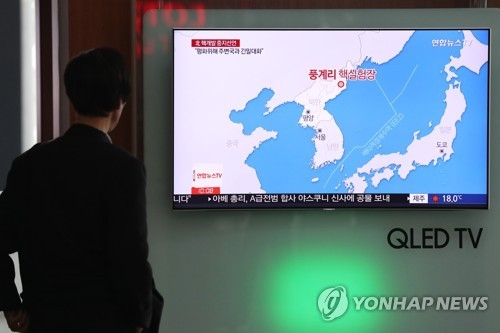
A South Korean at Seoul Station watches a television news report on North Korea's announcement that it will shut down its nuclear test site on April 21, 2018. (Yonhap)
South Korea's presidential office and Trump welcomed North Korea's decision.
"North Korea's decision is meaningful progress for the denuclearization of the Korean Peninsula, which the world wishes for," Cheong Wa Dae said in a statement.
"It will contribute to creating a very positive environment for the success of the upcoming inter-Korean and North-U.S. summits."
Trump tweeted, "This is very good news for North Korea and the World - big progress! Look forward to our Summit."
Kim had been preaching for the "byongjin" policy of simultaneously seeking nuclear and economic development, which was adopted at the WPK's meeting held in March 2013.
At Friday's meeting, he pledged to focus on boosting the North's economy, which has been crippled by tougher international sanctions, effectively unveiling a new line of policy.
"It is the strategic line of the WPK to concentrate all efforts of the whole party and country on the socialist economic construction" at the current stage where the North has risen to a political and military powerhouse, Kim said.
Cheong Seong-chang, a senior research fellow at the Sejong Institute, said that the North effectively ditched the "byongjin" policy and apparently is building up its bargaining chips to gain a security guarantee and easing of economic sanctions at the summits.
The move came after more than a year of heightened tensions sparked by Pyongyang's nuclear and missile aspirations. Kim and Trump exchanged bellicose rhetoric and personal insults last year, raising fears that Washington could carry out a military operation against the North.
A mood of rapprochement was created on the Korean Peninsula when, in his New Year's message, Kim announced a plan to send athletes and others to the PyeongChang Winter Olympics in February in the South.
The North's leader reaffirmed that he will seek "close contact and active dialogue with neighboring countries and the international community," in a bid to defend peace and stability on the Korean Peninsula, according to the KCNA.
"It was a well-calculated announcement. North Korea did not touch on denuclearization, but left door for negotiations by stating the suspension of nuke and missile tests," said Shin Beom-chul, a senior fellow at the Asan Institute for Policy Studies.
Experts remain cautious about the North's declaration, as it stopped short of expressing its intention to abandon nuclear weapons. Also the North did not mention the Yongbyon nuclear complex, where it has produced plutonium and enriched uranium.
The North reportedly suggested a need for phased and synchronous measures for denuclearization, but the U.S. has called for the dismantlement of its nuclear program in a complete, verifiable and irreversible manner.
President Moon said Thursday that North Korea has voiced a willingness for "complete denuclearization" and does not attach conditions that the U.S. cannot accept, such as the withdrawal of U.S. forces stationed in South Korea.
Ken Gause, a senior analyst at the U.S.-based CNA Corp. said that the North has given no indication that it is willing to dismantle nuclear weapons at the outset of the summits.
"If anything, they may agree to a broad declaration in favor of denuclearization followed by an incentive-based phase process. At least publicly, this does not meet the conditions President Trump has set forth for the U.S.-North Korea summit to go forward," he said.
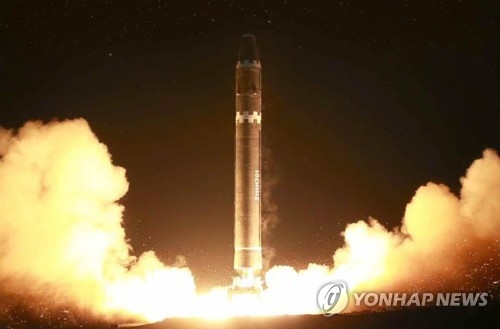
This photo, carried by North Korea's Rodong Sinmun, on Nov. 30, 2017, shows the North's firing of an intercontinental ballistic missile, known as the Hwasong-15, a day earlier. (For Use Only in the Republic of Korea. No Redistribution) (Yonhap)
sooyeon@yna.co.kr
(END)
-
 Defense chief says N. Korea's hypersonic missile 'unsuccessful' in last-stage glide flight
Defense chief says N. Korea's hypersonic missile 'unsuccessful' in last-stage glide flight -
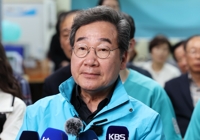 Ex-PM suffers crushing defeat
Ex-PM suffers crushing defeat -
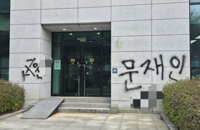 Man in his 40s nabbed for spray-painting slurs toward ex-President Moon
Man in his 40s nabbed for spray-painting slurs toward ex-President Moon -
 Police catch 1,681 over alleged election law violations
Police catch 1,681 over alleged election law violations -
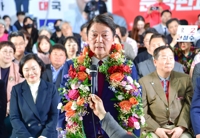 PPP lawmaker says entire Cabinet should resign over general elections defeat
PPP lawmaker says entire Cabinet should resign over general elections defeat
-
 Defense chief says N. Korea's hypersonic missile 'unsuccessful' in last-stage glide flight
Defense chief says N. Korea's hypersonic missile 'unsuccessful' in last-stage glide flight -
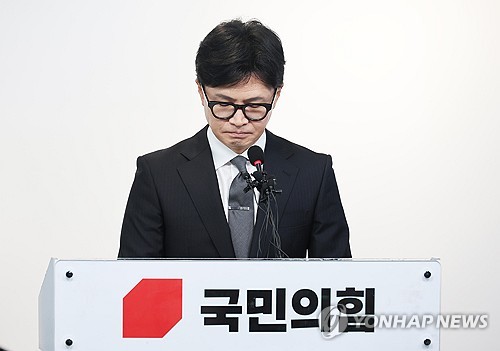 Ruling party leader resigns following election defeat
Ruling party leader resigns following election defeat -
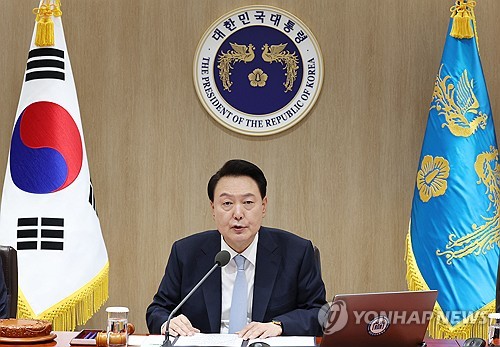 (LEAD) Yoon vows to improve communication with people after election defeat
(LEAD) Yoon vows to improve communication with people after election defeat -
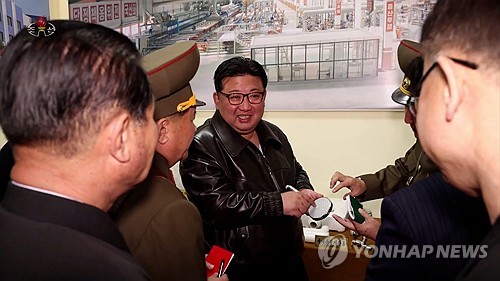 N.K. leader vows to deal 'death-blow' to enemy in event of confrontation: KCNA
N.K. leader vows to deal 'death-blow' to enemy in event of confrontation: KCNA -
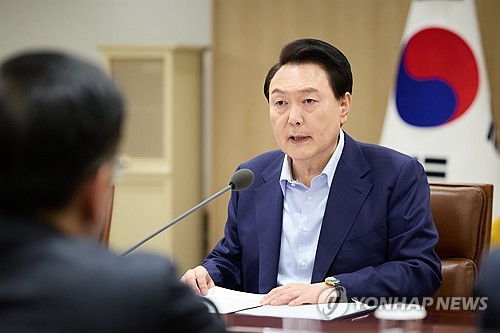 Yoon presides over emergency meeting on Mideast crisis
Yoon presides over emergency meeting on Mideast crisis
-
 N. Korea has capability to genetically engineer biological military products: U.S. report
N. Korea has capability to genetically engineer biological military products: U.S. report -
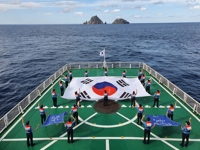 (LEAD) S. Korea 'strongly' protests Tokyo's renewed claims to Dokdo, calls in Japanese diplomat
(LEAD) S. Korea 'strongly' protests Tokyo's renewed claims to Dokdo, calls in Japanese diplomat -
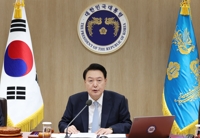 (LEAD) Yoon vows to improve communication with people after election defeat
(LEAD) Yoon vows to improve communication with people after election defeat -
 (2nd LD) Yoon apologizes for failing to heed people's will following election defeat
(2nd LD) Yoon apologizes for failing to heed people's will following election defeat -
 (2nd LD) S. Korea 'strongly' protests Tokyo's renewed claims to Dokdo, calls in Japanese diplomat
(2nd LD) S. Korea 'strongly' protests Tokyo's renewed claims to Dokdo, calls in Japanese diplomat













